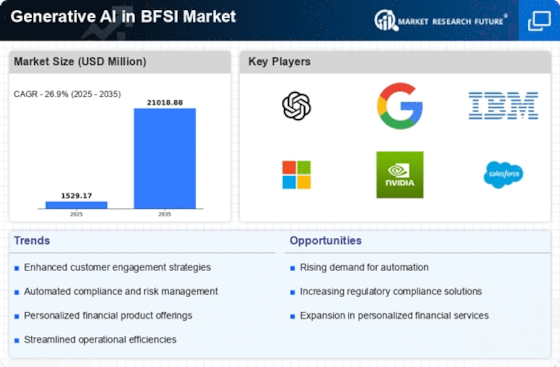Top Industry Leaders in the Generative AI in BFSI Market
Competitive Landscape of Generative AI in BFSI Market
The Banking, Financial Services, and Insurance (BFSI) sector stands on the cusp of a transformative era driven by Generative AI (GAI). This technology's ability to generate text, code, and other creative content offers immense potential for redefining customer experiences, optimizing operations, and boosting profitability. Understanding the competitive landscape in this burgeoning market is crucial for both established players and newcomers seeking to capitalize on the opportunities.
Key Players:
- Quantifind
- OpenAI
- Accenture
- DataRobot
- SAS
- IBM
- Microsoft
- Adobe
- NVIDIA
- Intel
Strategies Adopted:
- Platform focus: Several players offer comprehensive GAI platforms with various tools and pre-built models. This approach aims to cater to diverse BFSI needs and facilitate broader adoption.
- Vertical specialization: Startups excel by focusing on specific BFSI segments, providing deep expertise and customized solutions.
- Partnership ecosystem: Collaboration between tech giants, startups, and BFSI players is crucial for accelerating innovation and overcoming implementation challenges.
- Cloud-based solutions: The cloud enables easier access and scalability for GAI solutions, reducing upfront costs and democratizing access for smaller players.
Factors for Market Share Analysis:
- Technology capabilities: The platform's robustness, accuracy, and range of available GAI models heavily influence market share.
- Industry expertise: Understanding the specific nuances of the BFSI sector is crucial for developing effective solutions and gaining trust from clients.
- Implementation support: Providing seamless integration and ongoing support is essential for successful GAI adoption, especially within established BFSI firms.
- Compliance and security: Adherence to strict financial regulations and data security best practices is paramount for gaining and maintaining market traction.
New and Emerging Companies:
- Fintech startups: Companies like Plaid and Robinhood integrate GAI into their financial platform offerings, enhancing user experience and personalization.
- Regtech players: Companies like Jumio and Onfido utilize GAI for identity verification and fraud prevention, addressing critical security concerns in the BFSI domain.
- Data analytics providers: Companies like Palantir and FICO leverage GAI to analyze massive financial datasets, generating valuable insights for risk management and investment decisions.
Current Investment Trends:
- Increased spending on GAI platforms: Both large companies and startups are investing heavily in developing and refining their GAI platforms, aiming for increased functionality and wider market reach.
- Focus on specific use cases: Investments are shifting towards GAI solutions addressing specific pain points in areas like customer service, fraud detection, and personalized finance.
- Partnerships and acquisitions: Collaboration and consolidation are becoming increasingly common, with established players acquiring promising startups to bolster their offerings and expertise.
Latest Company Updates:
Jan 25, 2024: In a landmark deal, JP Morgan Chase has partnered with AI wealth management startup Artivest to offer personalized investment portfolios and insights to its high-net-worth clients. Artivest's GAI engine analyzes individual financial goals and risk tolerance to generate customized investment strategies. This collaboration marks a significant step towards AI-driven wealth management becoming mainstream.
Jan 23, 2024: Global insurance giant Swiss Re has implemented IBM Watson's GAI technology to automate its claims processing workflow. The AI solution analyzes documents, gathers information, and flags potential fraud, significantly reducing processing time and costs. This successful implementation paves the way for wider adoption of GAI in the insurance industry.
Jan 19, 2024: Bank of America is trialing Narrative Science's AI-powered reporting tool to generate quarterly financial reports. The tool uses natural language processing to analyze data and automatically draft narratives, potentially streamlining the reporting process and improving accuracy. This pilot project indicates rising interest in AI-driven financial reporting tools.
Jan 17, 2024: The UK Financial Conduct Authority has approved the first-ever AI-based insurance pricing model developed by insurtech startup SureQuote. The model uses deep learning algorithms to personalize premiums based on individual risk profiles, raising concerns about potential bias and fairness in AI-driven insurance pricing.
Jan 12, 2024: Google AI unveiled its "Vertex FinancialAI" platform, specifically designed for GAI applications in the banking and financial services sector. The platform offers pre-built models and tools for fraud detection, credit risk analysis,










